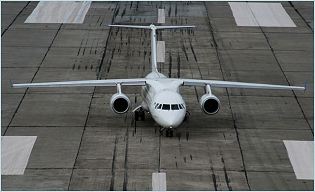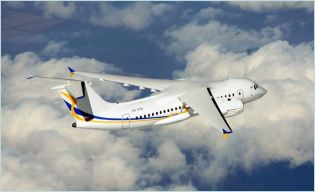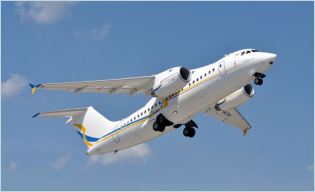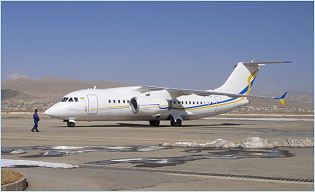AN-158 Antonov
| a | ||||||||||||||||||||||
|
AN-158 Antonov Regional transport jet aircraft
|
||||||||||||||||||||||
 |
||||||||||||||||||||||
|
|
||||||||||||||||||||||
|
The AN-158 is a regional jet of a new generation intended to carry up to 99 passengers over a range up to 4000 km. It is designed on a basis of AN-148 regional jet. The AN-158 has high commonality with its predecessor, in particular, they have common main systems, engines, cockpit and flight control system, MRO, flight crew training system. Comfort level of these airplanes correspond to the most modern airliners, their characteristics and safety level meets current and prospective world standards and requirements. The AN-158 performed its maiden on April 28, 2010. Till the end of 2011, ANTONOV completed wide programme of the aircraft certification. On February 28, 2011, the aircraft received Certificates issued by Interstate Aviation Committee and State Aviation Administration of Ukraine. They confirm the aircraft compliance with requirements of AP-25 harmonized with FAR-25 and CS-25. Having completed the programme of the certification tests it started trials on widening the operational conditions. In February 2011, the AN-158 performed 16 flights in Iran. It has proved its ability to be operated from/to elevated airfields at a height of 2200 m above sea level. Serial production of the AN-158 is launched at “ANTONOV Serial Plant”. More than 200 enterprises of 15 countries are involved into cooperation on the aircraft construction. The AN-158 design allows to develop on its basis a row of new airplanes including VIP versions, freighters and special-purpose airplanes for civil and military transport aviation. |
||||||||||||||||||||||
| Main Variants: | ||||||||||||||||||||||
|
- No variants at this time
|
||||||||||||||||||||||
| Technical Data | ||||||||||||||||||||||
| Design | ||||||||||||||||||||||
|
The An-158 aircraft is a high-wing monoplane with two turbofan jet engines mounted in pods under the wing. This arrangement protects the engines and wing structure against damage from foreign objects (FOD). A built-in auto-diagnosis system, auxiliary power unit, high reliability, as well as the wing configuration allow the An-148 to be used at poorly equipped airfields.
Internal cabin width of the An-158 is 3.13m (10ft 3in) and the internal headroom 2.00m (6ft 7in), making it markedly wider than its competitors and allowing for much larger overhead bins. The high-set wing structure does not impinge on the internal cabin. The ultra-modern cabin itself is equipped with first-class seating in a 2+2 layout or economy seating in a 3+2 layout, with forward and rear galleys and overhead drop-down flat TV screens for in-flight entertainment. The An-158 has two under-floor cabin compartments, again larger in volume than any of its competitors; two passenger doors on the left side of the fuselage, with the forward door having integral steps; and two service doors on the right side. All this combines to allow the aircraft to rapidly de-plane/re-board passengers and be serviced and turned around from both sides and from all four corners simultaneously. |
||||||||||||||||||||||
| Avionics | ||||||||||||||||||||||
|
The AN-158 is equipped with modern flight and navigation equipment, multifunctional displays and a fly-by-wire system enable the An-148 aircraft to operate day and night, under Instrument flight rules (IFR) and Visual flight rules (VFR) weather conditions on high density air routes. The An-148 cockpit features five 15 cm by 20 cm (6" by 8") liquid crystal display (LCD) panels built by Russia’s Aviapribor and fly-by-wire flight controls.
|
||||||||||||||||||||||
| Propulsion | ||||||||||||||||||||||
|
The An-158 uses two Ivchenko Progress-designed D-436-148 turbofans, with full-authority digital engine control (FADEC) and de-rated to each generate 15,000lb thrust (67kN). Engine start is by auxiliary power unit air. Maximum airport operating elevation is 3,000m (10,000ft), with clearance to 13,000ft under test; maximum crosswind is 30kt 56km/h) and the operating ground temperature range is -55°C ( -67°F) to 45°C (113°F). Service ceiling is 40,000ft and maximum speed is 470kt. Maximum take-off weight (MTOW) is 96,140lb (43.7t) and maximum landing weight is 83,160lb (37.8t). Quoted field length required at MTOW (sea level, international standard atmosphere) is 2,000m (6,600ft).
|
||||||||||||||||||||||
| Specifications | ||||||||||||||||||||||
|
||||||||||||||||||||||
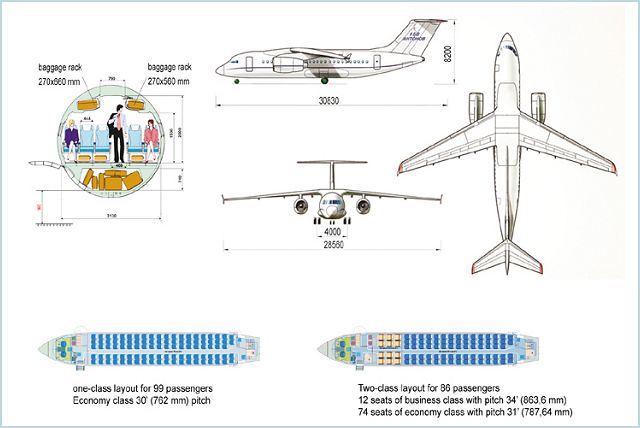 |
||||||||||||||||||||||
|
||||||||||||||||||||||



























